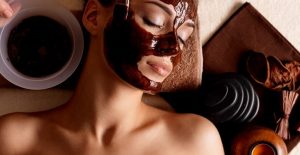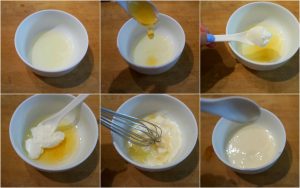Homemade face masks

In your home are some of the most powerful ingredients, not only for gourmet meals but also for beauty treatments. In fact, some of them can be used to make exotic face masks. From vinegar, mayonnaise, cooking oils, eggs, fruits and vegetables, to chocolate and wine, edible home ingredients have got what it takes — for a quick fix, or for long-term skin care.
Face masks play a vital role in skin care. They complete the cleansing process, dissolve impurities, soften dead cells and help their removal. This helps to refine the skin, making it clear, translucent and youthful. Face masks also stimulate blood circulation to the skin, while others soothe sensitive skin. Natural mask ingredients, like fruits and vegetables, for instance, contain vitamins and minerals that enhance skin beauty and can even heal specific skin problems.
Recent research has highlighted the health and beauty benefits of wine. The most popular wine used in skin care is the red grape wine. Wine is rich in antioxidants and contains valuable vitamins and trace elements that have a rejuvenating effect on the skin. Grape wine contains powerful antioxidants, known to delay the visible signs of ageing. Take honey and yogurt and add a few tablespoons of red wine. Apply this on the face and leave it on for 20 minutes. Rinse with plain water. This softens and moisturizes the skin, removes tan and also adds a glow. For an oily skin, mix red wine, green tea and oats.
Chocolate is a popular ingredient for face packs and can be made at home easily. Mix together three teaspoons cocoa powder and 2 teaspoons oats with egg white and one teaspoon each honey and yogurt. Adjust the ingredients, so that it is a thick paste, which does not drip. First cleanse the skin and then apply the mask, avoiding the lips and area around eyes. Wash it off after 20 to 30 minutes with plain water.
Fruits like banana, apple, mango, oranges and even kiwi, avocado and strawberries may be used for face packs. Avocado pulp can be mixed with aloe vera gel and applied on the face to nourish and moisturise the skin. Wash off with plain water after 20 minutes. Fresh and raw avocado should be used. Avocado contains about 20 vitamins and minerals. It is rich in antioxidants.
Papaya is a rich source of antioxidants, like Vitamins A, C and B, folate and pantothenic acid; and minerals like potassium, copper, and magnesium. Papaya contains papain, an enzyme, which helps to soften and remove dead skin cells, making the skin clearer and brighter. Ripe papaya pulp can be applied on the face, or can be mixed with other ingredients like oatmeal, curd and honey to make face masks. Leave on for 20 to 30 minutes and wash off with water. Papaya pulp mixed with curd can be applied on the body.
Many such face masks can be made at home:
For dry skin, mix half a teaspoon honey with the yolk of an egg and one teaspoon dried milk powder. Mix into a paste and apply on the face. Remove after 20 minutes with water. Ground almonds can be mixed with cream of milk for a nourishing mask. Mix ground almonds into a paste with cream. Apply on the face and leave on for 15 minutes. Then rub gently on the skin and rinse off with water.
For oily skin, mix half teaspoon honey and one teaspoon yogurt with the white of an egg. Add 2 teaspoons oats. Mix into a paste and apply. Remove after 20 minutes with water. For oily skin with enlarged pores, add lemon juice and a little milk to oatmeal. Apply the paste and remove after 20 minutes with water. For blackheads, mix egg white with oats and apply on the area. When it dries, moisten with water and rub gently on the face. Wash off with plenty of water.
Nature has provided such versatile ingredients for our sustenance and beauty. I would say that an entire range of cosmetic products exist in Nature.




